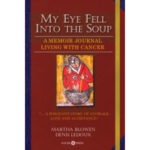Martha Blowen, my partner in life and in work, died on August 18, 2008, from metastasized breast cancer. The following is from collated excerpts of journals we both kept at the time. (Before she passed away, she gave me permission to share her entries.)
The memoir is called My Eye Fell Into the Soup, after a dream in which one of her eyes fell into a cauldron. She later interpreted this to mean she was not paying attention to her health. [This is written about elsewhere.] As with most people, I suppose, the cancer diagnosis was a shock. The italicized excerpts are hers: the others, mine.
In this selection, I am the main contributor as writing was therapeutic for me in the days following her cancer diagnosis when nothing blunted my consciousness. Fortunately, Martha was given sedatives and spent a good deal of her time sleeping.
The first excerpt is available here. Additional excerpts will follow on Saturdays.
By this point in the memoir, you will know that Martha had had a bout of cancer in 1992.
—
All Is not Right
November 9, 2006
I woke up in the night with severe searing pain around my heart and down my left arm.
Today in the office and then later at lunch, Martha complained about upper chest pain—“very severe,” she said.
She was disturbed about mistakes in the manuscript for our current client. These were ones we had not caught and should have. I said not to worry. We would correct them on our nickel. It was do-able. Why was she so pessimistic, so negative, about what we could easily enough solve? She was seeing the problem and not the solution.
I urged her to rest, to relax. Everything would be all right.
After lunch, she lay down for a while—unusual for her to lie down during her day.
I went into the office. While it was unseasonably cold for the 9th of November, the sun was shining brightly on the yellow walls and the room felt cozy and cheerful. We have worked in all sorts of environments—kitchen tables, the corners of rooms, in the basement while it was still unfinished. Sometimes when our children were little, I had taken refuge in libraries to find the tranquility to work. But now, we have our own office building, comfortably furnished and attractively finished.
“Very nice!” people who visit say as they scan the office nodding their heads appreciatively. “You’ve put this all together yourselves?”
Well, yes! It has been a long haul, marked by extended work weeks as we strove to find the formula for creating a memoir business that was right for our clients and right for us. For a long time, the ratios were off and then we began to get it and the income had increased and the satisfaction had increased. We have as many clients as we can handle and now have to work with editors off site.
Outside, the south field that is my view is brownish. Across this field, on many occasions, we have seen turkeys and deer and an occasional fox. The fox came in the summer, when the field was being cut and the hay tedded. He would follow the tractor and pounce on the mice and the moles that had been disturbed. He would suddenly jump up and then land in the row of hay. Then rising again, he held something squirming in his jaws.
Martha Feels More Pain
I was alone in the office. How was Martha doing?
When I went into the house to check on her, she said her pain had gotten worse. “It’s on the left side. What if I’m having a heart attack?” she asked. “Should I go in to a hospital emergency room? It seems crazy to ignore heart attack symptoms.”
She seemed diffident about deciding and frightened—as if deciding to go would make something real about what might be found. But, who can’t understand that feeling?
“Yes, of course. I’ll support your going, but you’ll have to decide. It’s your body.”
“I want to go to Parkview Hospital,” she answered decisively.
Because the air was bracing even though the sun was shining, I went out to start the car, to warm it up. I do not enjoy winter; I hate the thought of its coming on. The cold, the extra work needed for so many things. Warming the car, cleaning the windshield of ice. Bringing wood in and cleaning the ash bucket regularly. The darkness.
Martha came out holding herself stiffly against the pain. She seemed in another zone of discomfort than in the morning. Was she having a heart attack? Her mother had, after all, had a heart attack in 1996. She had had symptoms for a number of days, ignoring them, continuing her life and going to her job. Her stoicism—or was it something else?—had landed her in Intensive Care at the Maine Medical Center in Portland for ten difficult days.
I grabbed my journal and a few fruits. There was no knowing how long this would take.
Going to the Hospital
The ride to Brunswick was punctuated with our occasional comments about projects with various clients. (Perhaps we were covering our fear of what awaited at the hospital? Perhaps we were trying to be “ordinary”?) Martha and I had worked side by side for most of our lives together. Our home life and our work life were intermixed so that they occurred in the office as well as in the house. That did not bother me, but it often did Martha. She functioned as a second in command and perhaps that made it easier for her to leave our work behind.
We were quiet as we drove down Maine Street in Brunswick, passed the church where Harriet Beecher Stowe had the vision of Eliza crossing the ice flows with her little Harry in her arms. Right after the service, Stowe had returned to her house on nearby Federal Street to begin to write Uncle Tom’s Cabin. We went by Bowdoin College, students walking quickly, entering imposing buildings, exiting them, rushing along sidewalks. The school’s attractive buildings lined the street and blocked the view of the inner mall. We continued down Maine Street as it left the downtown and the college behind. We were approaching Parkview.
What Is This Pain?
“I’m worried,” she said. “The pain is getting worse. I’m wondering if the massage yesterday dislodged something, removed some barrier to pain so that I can feel this whatever-it-is today?”
“We’ll probably know soon,” I replied. What was the use of “awful-izing?”
We went immediately to the front desk where Martha told the receptionist how she was feeling. The woman rose to her feet and came out from behind her desk.
“You are probably having a heart attack!” she said, “Follow me.”
Then, the woman went into an area where there were gurneys. Obviously, we had entered the emergency room. The woman was quite a bit ahead of us now.
Martha turned to me, “I don’t think that was reassuring!” She managed to smile. Oddly, it was reassuring to me to latch on to a specific problem rather than to the generalize one that I had mitered over since Martha said she wanted to come to the hospital. A cancer diagnosis was always lurking in our minds.
Do you have a story about learning you or a loved one had a serious illness? Please share with us below.
To accelerate your mastering-the-writing curve, take advantage of all the resources in the Memoir Start Up Package. It comes with over $40 of bonuses. Click here to get your copy and benefit immediately to write your memoir.
This post is one of over 500 informative, well-written articles we have made available to you on this site.
We’ve contributed to your writing success; now we ask you to contribute to the expansion of the memoir conversation.
By reposting this article on your blog or website or reposting on your favorite social media, you will inform your fellow memoir writers of the programs and services—many for free like the blogs—that are available at TheMemoirNetwork.com.
Thanks for your generosity. You rock.


This is a vivid description of what must have been a harrowing experience. I have had family members with cancer but no first hand knowledge of finding out. A sister’s son, my father, two aunts have passed from this life that way. Other loved ones have had first-hand experience with with that terrible invader.
One of the few good things about living so far away from family is not having to watch loved ones suffer. The other side of the coin is not being there to hold them while they cry(:.
Dear Charlotte, Thank you for your comment. Yes, the experience was a difficult one. I sometimes described it as more difficult than difficult. The scene in the post was the beginning. It would last for almost two years. Very difficult but also the years of the greatest intimacy in our relationship.